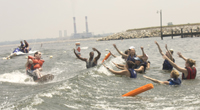|
|
|

|
|
|
Clinic gives experience of a lifetime
|
|
by Dawn Brazell
Public Relations
A picket fence is a good thing, especially for people learning to water
ski the first time, despite challenging disabilities.
 The picket
fence of waving human hands means safety. It means success. It means
the participants were brave enough to try something new. The picket
fence of waving human hands means safety. It means success. It means
the participants were brave enough to try something new.
Physical and
occupational therapy students put up a picket fence to catch incoming
skiers who are participating in the Adaptive Water Sports Clinic,
sponsored by Anchors Away and Achieving Wheelchair Equality. For
information on Anchors Away, visit http://anchorsawayprogram.org/
or AWE, visit http://www.knology.net/~drc/awe/.
The bravery comes in part from the waving hands of MUSC
volunteers—physical and occupational therapy students—who are waiting
in the waves to catch incoming skiers to make sure they have safe
landings. Sara Kraft, DPT, said it’s an incredible experience for all
the participants.
About 30 physical therapy students and two faculty members, Kraft, and
Noelle Moreau, Ph.D., volunteered at the Adaptive Water Sports Clinic.
MUSC occupational therapists also assisted. The clinic, which was held
on June 19 and 20 at Lion’s Beach in Moncks Corner, is hosted by
Anchors Away and Achieving Wheelchair Equality (AWE).
Kraft said the students get the experience of working with clients with
all kinds of disabilities, teaching them how to water ski, jet ski and
kayak. “They did it all. I trained them on Saturday, and then on
Sunday, it was all their show. They lifted the patients and did the
water tests. It was a great experience to see just what people in
wheelchairs can do, and to be able to help them.”
Physical therapy student Matthew Dobson said the clinic was one of the
highlights of his experiences at MUSC. “It was amazing to have the
chance to see people getting to ski who normally wouldn’t have the
chance. I think what impacted me the most was all the smiles that I got
to see,” he said. “As soon as someone gets up on the ski, the biggest
smile you’ll see spreads across their face.”
He had one participant tell him that because of the experience, she was
inspired to go out and try other things. He and his wife, Katie, also
were able to help a deaf participant since they knew sign language from
their years of volunteer work at Camp Sertoma. They helped him get
measured for skiing, and to do the preparation work in the water.
“We were able to make sure that he was fine and understood everything
that was going on. Katie also went in the boat so that she could
communicate with him while he was skiing,” he said. “Having that skill
was very helpful, though I don’t think that anyone needed to know
American Sign Language to see that he had fun when he got back from
skiing.”
Each year the event has grown. Kraft said the participants get to
connect with other people with similar disabilities and form
therapeutic relationships.
“I’ve seen many people come out of their shells at that clinic. It also
opens their eyes to what is possible.”
Kraft said she loves that MUSC participates in the program because it’s
a way to give back to AWE. AWE volunteers give hours of their time
teaching MUSC students practical skills, and hosting a sports
clinic.
The students get the chance to get in wheelchairs and play various
sports, being taught by people who are wheelchair-bound.
Kraft said that the AWE volunteers do so much for MUSC. “I think it’s
really great that we reciprocate by coming out there and helping them
with an activity. It’s a win-win for all parties.”
Friday,
July 30, 2010
|
|
|



 The picket
fence of waving human hands means safety. It means success. It means
the participants were brave enough to try something new.
The picket
fence of waving human hands means safety. It means success. It means
the participants were brave enough to try something new.